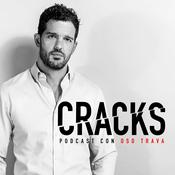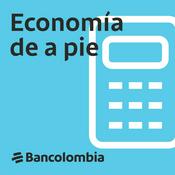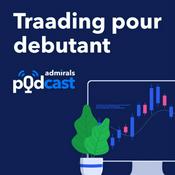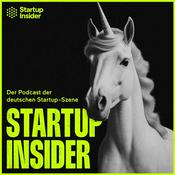81 episodios
From 36 Cents To 32 Cents: The Growing Gender Wealth Gap No One Talks About | Kristine Beese, Founder and CEO of Untangle Money
24/11/2025 | 1 h 11 minThe retirement crisis is a women's crisis - and the numbers are shocking! For every dollar men have in wealth, women have just 32 cents. Even worse? That gap is growing, not shrinking.
In this episode, I speak with Kristine Beese, Founder and CEO of Untangle Money, about the alarming wealth gap affecting women and why traditional financial services aren't designed for our needs. Kristine shares powerful insights from her journey as a former stock analyst and portfolio manager to building a FinTech solution that's actually helping women take control of their financial futures.
We explore the real drivers behind wealth inequality, the hidden costs women face throughout their careers (hint: it's between $500K-$1M in lost earnings in the US and Canada), and why financial stress hits women harder. Kristine also breaks down her practical "hours worked" framework that removes judgment from spending decisions and explains why robo-advisors might be your best investment ally.
🔑 Key Highlights:
Women have lost ground on wealth accumulation — from 36 cents to 32 cents per dollar over just one decade
Why women plateau in earnings at age 40 while men continue earning $10K-$25K more annually for 25+ years
The powerful "hours worked" framework that transforms how you think about money and joy
Why every rich person has a financial plan, but middle-income earners don't — and how that needs to change
How living to 95 (not 90) completely changes your retirement planning strategy
👉 Kristine Beese
LinkedIn: https://www.linkedin.com/in/kristinebeese/
Website: https://www.untangle.money/
👉 Monica
LinkedIn: https://www.linkedin.com/in/monicamillares/
YouTube: https://www.youtube.com/@moni_millares
TikTok: https://www.tiktok.com/@moni_millares
Follow for more discussions on building FinTech products with customer and commercial impact and to stay updated on the latest episodes.
We cover
[00:00:00] The retirement crisis is a women's crisis
[00:02:00] Shocking stats: 32 cents on the dollar wealth gap
[00:06:00] Why the wealth gap keeps growing
[00:11:00] Untangle Money: Building purpose-driven FinTech
[00:15:00] Women's financial superpowers we don't talk about
[00:18:00] The $500K-$1M career earnings gap explained
[00:24:00] The longevity paradox: Why living longer is actually a superpower
[00:28:00] How financial stress affects women differently
[00:33:00] Why Untangle Money threw out traditional financial planning
[00:39:00] The revolutionary "hours worked" spending framework
[00:49:00] Managing spending with joy, not judgment
[00:55:00] Why robo-advisors beat 80% of professional investors
[01:00:00] Planning for 95, not 90: The retirement reality check
[01:08:00] Key takeaway: Every rich person has a financial plan
SEARCH QUESTIONS
Why is the retirement crisis worse for women?
What is the women's wealth gap in 2025?
How much less do women earn than men over their careers?
Why do women plateau in earnings at age 40?
How to calculate what I can afford using hours worked?
What is Untangle Money and how does it work?
Why are women better investors than men?
How much money do I needHow To Get Into Home Ownership With Just 1% Down (No Mortgage Required) | Chris Smith, Founder and CEO at Bloxxs
19/11/2025 | 33 minWhat if home ownership could start with just 1% down and you could build equity without taking on any debt? This revolutionary approach is transforming how people achieve the dream of owning their own home.
In this episode, I speak with Chris Smith, Founder and CEO at Bloxxs. We explore an alternative to traditional mortgages that's opening doors for people who thought home ownership was out of reach. Chris shares his powerful journey from banking executive to unpaid startup founder, building a solution that directly connects capital to aspiring homeowners.
We dive into the innovative “subscription” model that's making home ownership accessible, how indigenous values are reshaping our approach to property and community, and why Chris and his team of 20 executives have worked unpaid for years to bring this mission-driven vision to life. This conversation reveals how one bold idea is creating pathways to happier, healthier lives through the stability and security of home ownership.
Follow for more discussions on building FinTech products and teams with customer and commercial impact and to stay updated on the latest episodes.
👉 Follow Chris:
LinkedIn: https://www.linkedin.com/in/therealchris-smith/
Website: https://www.bloxxhome.com/
👉Follow Monica:
LinkedIn: https://www.linkedin.com/in/monicamillares/
YouTube: https://www.youtube.com/@moni_millares
TikTok: https://www.tiktok.com/@moni_millares
We cover:
[00:00:00] The mission: Making home ownership accessible to everyone
[00:03:00] Why home ownership creates happier and healthier societies
[00:05:00] From banking executive to unpaid founder: The inspiring journey
[00:08:00] Lessons from 2008: Understanding what needs to change
[00:10:00] Building a values-driven company with 20 unpaid executives
[00:13:00] The power of sacrifice: Protecting the mission over profits
[00:16:00] How capital really flows in the housing market
[00:18:00] The Blocks breakthrough: Subscription to home ownership explained
[00:20:00] Starting with 1% deposit instead of 20%: Opening new doors
[00:23:00] Built-in flexibility: Supporting homeowners through life's challenges
[00:27:00] Indigenous values: Community-driven approach to home ownership
[00:30:00] The vision: Taking Blocks global and helping millions
[00:32:00] From social housing to solutions: Why this mission is personal
[00:34:00] Creating pathways to stability, security, and intergenerational wealth
SEARCH QUESTIONS
How to buy a house with 1% deposit?
What is Blocks home ownership platform?
How does home ownership without a mortgage work?
Can you buy a home without taking on debt?
What are innovative alternatives to traditional mortgages?
How do subscription home ownership models work?
What is equity-based home buying?
How to get into home ownership in 2025?
What are alternatives to traditional mortgages?
How does home ownership create happiness and stability?
Can you buy a home without a 20% deposit?
What is the subscription model for home ownership?
How to build equity in a home without debt?
What is purpose-driven FinTech innovation?
How do indigenous values apply to property ownership?
What are solutions to the housing affordability challenge?
How...The Future of SMB Banking: AI, Automation, and Financial Intelligence | Akhil Nigam, CoFounder at Finmo,
06/11/2025 | 37 minIn this episode, I speak with Akhil Nigam, CoFounder at Finmo, and we answer the critical question: How can global businesses transform their fragmented treasury operations into unified, intelligent systems that drive growth?
He shares insights on why SMEs deserve better treasury solutions, how real-time payment rails are transforming cash management, and why MO AI is becoming the intelligent co-pilot every finance team needs.
👉 Follow Akhil Nigam:
LinkedIn: https://www.linkedin.com/in/akhilnigam562/
Website: https://finmo.net/
👉 Follow Monica:
LinkedIn: https://www.linkedin.com/in/monicamillares/
YouTube: https://www.youtube.com/@moni_millares
TikTok: https://www.tiktok.com/@moni_millares
We cover:
[00:00:00] Why SMBs should be at the center of treasury innovation
[00:01:00] The economic impact of SME financial health on the wider economy
[00:03:00] Why SMBs are fast-moving segments banks ignore for enterprise clients
[00:05:00] How automation frees finance teams from manual work to focus on growth
[00:07:00] Enterprise vs SMB treasury: The critical differences explained
[00:10:00] The connected finance challenge: Why bank integration matters
[00:12:00] The purpose behind building Finmo's complex treasury platform
[00:15:00] Why the founding team's diverse skill set made payments possible
[00:16:00] How to keep purpose alive when you're in the trenches
[00:19:00] Reimagining treasury workflows: Real-time visibility and forecasting
[00:20:00] The cosmetics company spending $1M on treasury with 6-month reporting delays
[00:22:00] Outcome-driven product development: From features to measurable KPIs
[00:23:00] Introducing MO AI: The intelligent advisor for CFOs
[00:27:00] The practical transition: From FinTech to AI-powered FinTech
[00:30:00] How Finmo uses AI to help AI build AI (yes, really!)
[00:33:00] Upskilling product teams on vector databases, MCPs, and AI infrastructure
[00:34:00] Advice for PMs: How to upskill on AI when it's not your day job
[00:37:00] The cost reality of AI: Why capital intensity matters for innovation
[00:38:00] Final message: From reactive reporting to growth driver
Search Questions
What is the difference between enterprise and SMB treasury management?
How can SMEs get real-time cash visibility across multiple currencies?
Why do finance teams spend so much time on manual reconciliation?
What is MO AI and how does it help CFOs?
How to transform fragmented treasury operations into unified systems?
What are real-time payment rails and why do they matter?
How much does treasury management software cost for SMBs?
Why is connected finance important for global businesses?
How to automate cash flow forecasting for small businesses?
What is the biggest challenge SME finance teams face?
How to build AI-powered features in FinTech products?
What skills do product managers need to understand AI?
How to upskill on AI for non-technical product teams?
Why is AI implementation so expensive for startups?
What is vector database and MCP in AI development?
How to justify AI costs in early-stage FinTech companies?
What is purpose-driven product development in FinTech?
How to measure success in treasury management...How To Actually Protect Your Crypto Users: 79% of Users Demand This Crypto Feature | Anthony Yeung, Chief Commercial Officer at CoinCover,
22/10/2025 | 43 minTrust remains the biggest barrier to crypto adoption. Security breaches, lost access, and the fear of irreversible mistakes keep 79% of users demanding better protection before they'll fully commit to crypto.
In this episode, I speak with Anthony Yeung, Chief Commercial Officer at CoinCover, the leader in digital asset protection, and we answer the critical question: How can FinTechs build crypto products that users actually trust?
Anthony shares insights on the real risks FinTech leaders need to understand when building crypto offerings, the layered protection approach that top institutions use, and why traditional banking security just doesn't transfer to the crypto world.
🔑 Key Highlights:
Why 79% of crypto users demand mandatory compensation schemes for protection
How 20% of all Bitcoin ($billions) is permanently lost due to access issues
Why your existing bank security partners won't work for crypto infrastructure
The layered defense approach that protects 600+ institutions globally
How fraud protection with compensation builds trust like traditional card payments
Follow for more discussions on building FinTech products with customer and commercial impact and to stay updated on the latest episodes.
👉 Follow Anthony Yeung:
LinkedIn: https://www.linkedin.com/in/coincover-anthony/
Website: https://www.coincover.com
👉 Follow Monica:
LinkedIn: https://www.linkedin.com/in/monicamillares/
YouTube: https://www.youtube.com/@moni_millares
TikTok: https://www.tiktok.com/@moni_millares
We cover:
[00:01:00] Why trust is crypto's biggest barrier to adoption
[00:05:00] What is CoinCover and why 600+ institutions use it
[00:09:00] The loss of access crisis: 20% of Bitcoin is gone forever
[00:14:00] When exchanges get hacked: The $1.5B Bybit story
[00:18:00] Why the crypto industry collaborates differently than traditional finance
[00:19:54] The risks FinTech CEOs don't know they don't know
[00:22:14] Why you can't reuse your bank security partners for crypto
[00:27:45] Making crypto accessible: Beyond the top of the pyramid
[00:30:32] What is layered protection and why it matters
[00:35:30] How to protect against loss of access to wallets
[00:41:11] The breakthrough: Fraud protection that works like card disputes
[00:44:33] Why 79% of users demand compensation schemes
[00:45:48] Top 3 takeaways for FinTech teams launching crypto
[00:47:52] CoinCover's global reach and regulatory approach
SEARCH QUESTIONS
How to protect crypto users from losing access to wallets?
Why is 20% of all Bitcoin permanently lost?
How do crypto exchanges get hacked?
What is layered protection in crypto security?
How to build trust in crypto products?
Why traditional banking security doesn't work for crypto?
What happens when users lose their crypto wallet password?
How to prevent crypto fraud and scams?
What is non-custodial crypto backup?
How much does crypto security cost for FinTech companies?
What are the biggest risks when launching crypto products?
How to make crypto accessible for mainstream users?
What is MPC and multi-sig in crypto security?
How does crypto fraud protection with compensation work?
Why do...Solving Wealth Management for MENA Henrys: Why Sharia-Compliant Investment Platforms Matter | Ziad Mabsout, Co-Founder & CEO at Vennre
02/10/2025 | 40 minThe MENA region presents a massive opportunity for growth: The High Earners, Not Rich Yet (HENRY's).
In this episode, I speak with Ziad Mabsout, Co-Founder & CEO at Vennre, about building investment platforms specifically for the Henry segment in MENA and why Sharia-compliant solutions are an unlock.
Ziad shares his journey from getting rejected for a $50K investment to building a fintech that solves exactly the problem he had back then: Accessibility. We explore how the lack of pension systems in MENA creates urgent demand for investment solutions, and why Sharia-compliant products attract non-Muslim customers seeking ethical investing options.
We dive deep into the unique challenges of building for emerging markets, the importance of customer protection in investment platforms, and practical strategies for serving high earners who lack access to private banking. Ziad also shares invaluable insights on startup team building, the importance of conviction in your mission, and why being humble while staying persistent is crucial for FinTech founders.
Follow for more discussions on building FinTech products with customer and commercial impact and to stay updated on the latest episodes!
👉 Follow Ziad Mabsout:
LinkedIn: https://www.linkedin.com/in/ziadmabsout/
Website: https://www.vennre.com/
👉Follow Monica:
LinkedIn: https://www.linkedin.com/in/monicamillares/
YouTube: https://www.youtube.com/@moni_millares
TikTok: https://www.tiktok.com/@moni_millares
We cover:
[02:30:00] Defining High Earners, Not Rich Yet (Henrys)
[05:12:00] Why Henrys are underserved by traditional wealth management
[08:31:00] The relationship with money: spending, saving, investing
[12:40:00] MENA vs Western market differences for Henrys
[17:26:00] The pension gap crisis in emerging markets
[20:00:00] Understanding Sharia-compliant investing
[23:46:00] Why non-Muslims choose Sharia-compliant products
[26:10:00] Incorporating Zakat calculation into the platform
[34:09:00] Building startup teams: values, attitude, conviction
[36:34:00] The importance of humility and learning as founders
[39:05:00] Handling failures and maintaining persistence
[42:52:00] Future vision and conviction in the Henry market
SEARCH QUESTIONS
What is FinTech?
What are Henrys in FinTech and why do they matter?
How to build investment platforms for high earners in MENA?
What is Sharia-compliant investing and how does it work?
How to build FinTech products for emerging markets?
What is the pension gap in MENA region?
How to serve underserved high earners with FinTech?
Building wealth management platforms for professionals?
What makes Sharia-compliant FinTech successful?
How to protect customers in investment platforms?
Building startup teams in FinTech: best practices?
Why is team building harder than fundraising for startups?
How to find a job in FinTech?
How to validate FinTech product ideas in MENA?
What are the challenges of building FinTech in emerging markets?
How to design investment products for busy professionals?
What makes investment platforms successful in MENA?
How to serve the middle market in...
Más podcasts de Economía y empresa
Podcasts a la moda de Economía y empresa
Acerca de Purpose Driven FinTech
Welcome to Purpose Driven FinTech!
I'm your host, Monica Millares - Product Leader and fellow FinTecher.
These days, with the rising cost of living, financial stress among customers, loss of trust in banks, speculation of crypto, and uncertainty, we're facing unprecedented challenges. But there is hope. We as FinTechers have the power to make a positive impact.
Our products, the how we do product, and our people can make a difference on customers’ financial lives - and as a result, in the quality of their lives.
However, more than ever Founders, CEOs, Leadership teams and all FinTechers have a ton of pressure to build solutions that actually solve customer problems, that people want, that are differentiated And profitable
Yes that's you and me too!
That's why I've created this podcast!
I speak with FinTech CEOs, Founders, and Csuites to uncover their stories, challenges, and lessons learnt in building products with impact.
You'll get to hear real-life conversations, and you’ll walk away with practical questions, frameworks and insights that you can apply to your own FinTech products. So, are you ready to make a bigger difference in FinTech?
Let's come together and discover how Purpose, Product, and People can help us create a future of better financial wellbeing while building sustainable and profitable FinTechs.
Follow me on LinkedIn, TikTok, and YouTube to stay connected and be part of the conversation.
Cheers to making better FinTech and making FinTech better!
Love, Moni
Sitio web del podcastEscucha Purpose Driven FinTech, Libros para Emprendedores y muchos más podcasts de todo el mundo con la aplicación de radio.net
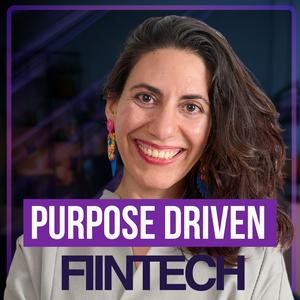
Descarga la app gratuita: radio.net
- Añadir radios y podcasts a favoritos
- Transmisión por Wi-Fi y Bluetooth
- Carplay & Android Auto compatible
- Muchas otras funciones de la app
Descarga la app gratuita: radio.net
- Añadir radios y podcasts a favoritos
- Transmisión por Wi-Fi y Bluetooth
- Carplay & Android Auto compatible
- Muchas otras funciones de la app


Purpose Driven FinTech
Escanea el código,
Descarga la app,
Escucha.
Descarga la app,
Escucha.




